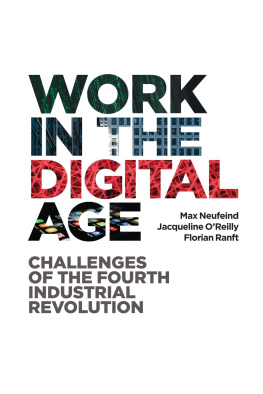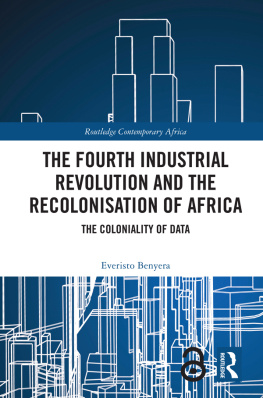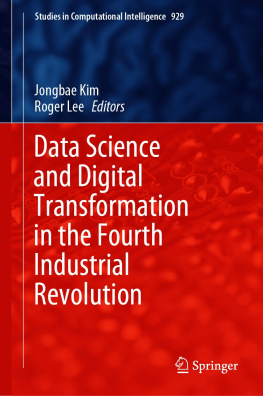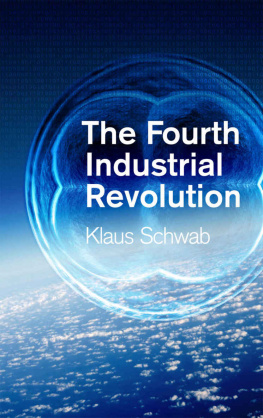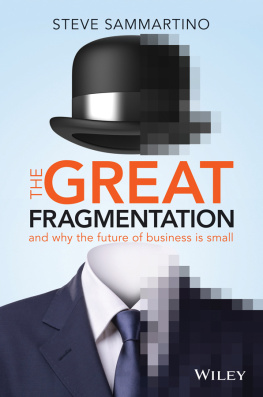Praise for Work in the Digital Age
Work in the Digital Age is a superb collection of articles that together provide a wide-ranging, comprehensive analysis of the challenges and opportunities for labour in a period of rapid technological change. This volume is essential reading for academics and policymakers alike.
Kathleen Thelen , MIT
Everybody is in favour of technological innovation and modernisation, yet not enough research and discussion is devoted to the actual consequences for society. Work in the Digital Age brings together leading European academics and thinkers to help us find our course, as the future hurtles toward us at breakneck speed.
Lszl Andor , European Commissioner for Employment, Social Affairs and Inclusion (20102014)
Work in the Digital Age should be required reading for the many groups around the world that are being formed to plan for the future of work in the age of digitisation. These European experts explore the broad terrain of private actions, public policies, and social dialogue needed to ensure that technological innovations can be shaped to benefit society while providing adequate compensation and adjustment opportunities for those who might otherwise bear the costs. As such, they lead the way for the rest of us.
Thomas A. Kochan , MIT Sloan School of Management
Work in the Digital Age is a valuable contribution to understanding how technology is disrupting the way we work and threatening the safety net that has long undergirded successful economies. We need a clear vision for the path forward, and this book helps provide that.
Steven Hill , Berlin Social Science Center
This edited volume provides a very valuable overview over the general discussion about the potential impact of new technologies on the future of work. The book is unique in the way in which it brings together a series of case studies showing how the topic is discussed in different countries. It is essential reading for everybody interested in this crucial public policy debate.
Henning Mayer , Social Europe
The transformation of employment in the digital era raises fears of insecurity, technologically induced unemployment and more stress at work. The political and academic discourse of digital technology and its impact on work is often alarmist and resorts to drastic policy recommendations. The collection of essays in Work in the Digital Age is a highly welcomed contribution that offers a rich understanding of the complex interaction between the role of new technologies in the world of work and the welfare state. There will be no simple solutions to maintain good work and a good society in the digital age. Policymakers have to shape it themselves and need high quality intellectual input of this sort.
Anke Hassel , Hertie School of Governance and Institute of Economic and Social Research (WSI)
Work in the Digital Age is a cutting-edge collection of articles on the future of work, offering a comprehensive treatment of current debates regarding the effects of new technology on employment, labour relations and inequality. As the authors make clear, the implications for public policy are profound. This book is an essential guide to the challenges of equity and policy that are emerging as digital technologies reshape the workplace.
Michael J. Handel , Northeastern University
The editors of Work in the Digital Age have done the rest of us a great service in bringing together this remarkable group of contributors. Carefully balancing broad themes and detailed country studies, the collection is a must-read for scholars and students from multiple disciplines interested in how current technological change is affecting work and employment.
Christian Lyhne Ibsen , Michigan State University
Work in the Digital Age is the major contemporary challenge. This book not only provides access to the outstanding trends, developments and challenges in the world of work and how to deal with them, it also provides country-specific access to the topic of digitalisation through country case studies.
Wolfgang Schroeder , University of Kassel
How does the process of digitalisation transform the nature of work? Do the new technologies lead to labour disruption including rising wealth inequality or increasing regional disparities? Do they offer the potential for new and exciting business opportunities and economic growth? What are the major challenges for policymakers? This excellent volume offers a range of compelling answers to these pertinent questions by some of the worlds leading labour market experts.
Jette Steen Knudsen , Fletcher School of Law and Diplomacy, Tufts University
We are living in a time of major change in the labour market. Automation is altering both the amount and the nature of work as well as the skills, protections, and opportunities of people in all corners of society. Coming alongside unprecedented advances in human health and the ageing of populations, these changes throw up many challenges for policymakers. The proposals outlined in this impressive collection are an important contribution to the conversation about how to enable all citizens to have the opportunities they need to succeed in the new world of work.
Seamus Nevin , Institute of Directors, London
The thematic arc of Work in the Digital Age makes clear that many futures of work are possible and these futures are the consequences of choices that will be made by governments, businesses, technologists, educators, unions and activists working at the grassroots. Prior periods of technological innovations ushered in great social changes as people explored the uses and functions of new tools and systems. What is singularly remarkable about the digital age is that innovations are driving unpredictable, black swan events that are occurring at increasing frequency, in many forms, on multiple fronts and at a global scale. The challenge for policy makers is to see past each new technological event and, instead, establish and articulate and enduring set of principles that will guide the uses of unimagined technologies to the benefit of people and societies. Work in the Digital Age provides a great foundation that will help policy makers meet this challenge.
Peter A. Creticos , Institute for Work & the Economy
This is a refreshingly broad and original exploration of the current upheaval in work and employment. The power of the contributions by remarkable team is greatly enhanced by their brevity. It will be important in shaping the gathering international debate on policy choices.
William Brown , Cambridge University
Going beyond the buzzwords Work in the Digital Age provides a comprehensive analysis of how emerging technologies reshape the workplace and the labour market. Particularly the comparative perspective is highly valuable for academics and policymakers. This book is a major reference point in ongoing discussions on the future of work.
Professor Dr. Werner Eichhorst , IZA Institute of Labor Economics
WORK IN THE DIGITAL AGE
About Policy Network
Policy Network is the international ideas exchange for progressives. More than just a thinktank, its network spans national borders across Europe and the wider world with the aim of promoting the best progressive thinking on the major social and economic challenges of the 21st century.
What makes Policy Network unique is our ability to connect policymakers and policy implementers. We combine rigorous analysis of the biggest questions facing modern societies with creative thinking on how to turn those fresh solutions into dynamic political narratives that can deliver electoral success for progressive parties.

